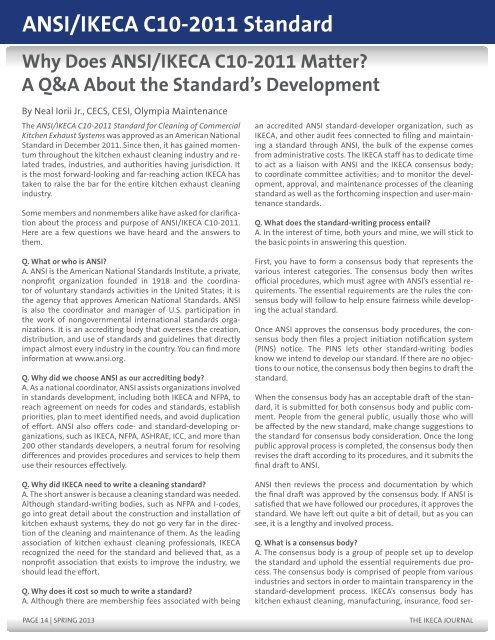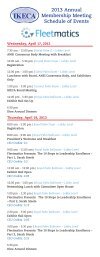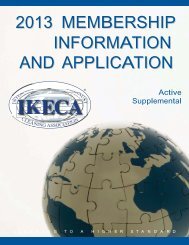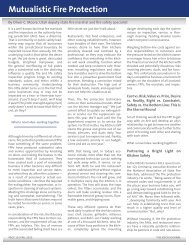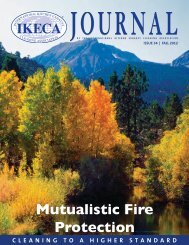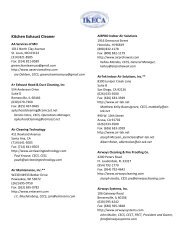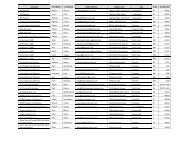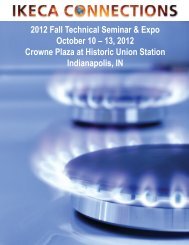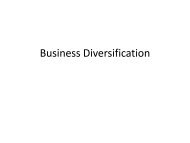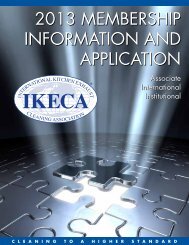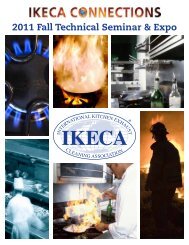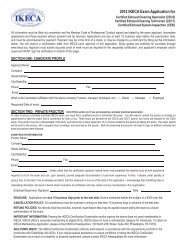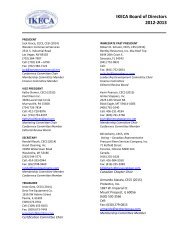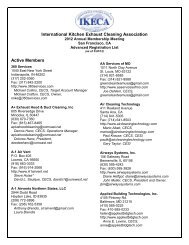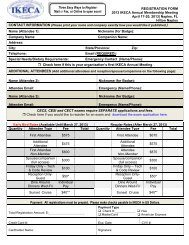Why Does ANSI/IKECA C10-2011 Matter?
Why Does ANSI/IKECA C10-2011 Matter?
Why Does ANSI/IKECA C10-2011 Matter?
Create successful ePaper yourself
Turn your PDF publications into a flip-book with our unique Google optimized e-Paper software.
<strong>ANSI</strong>/<strong>IKECA</strong> TITLE <strong>C10</strong>-<strong>2011</strong> Standard<br />
<strong>Why</strong> <strong>Does</strong> <strong>ANSI</strong>/<strong>IKECA</strong> <strong>C10</strong>-<strong>2011</strong> <strong>Matter</strong><br />
A Q&A About the Standard’s Development<br />
By Neal Iorii Jr., CECS, CESI, Olympia Maintenance<br />
The <strong>ANSI</strong>/<strong>IKECA</strong> <strong>C10</strong>-<strong>2011</strong> Standard for Cleaning of Commercial<br />
Kitchen Exhaust Systems was approved as an American National<br />
Standard in December <strong>2011</strong>. Since then, it has gained momentum<br />
throughout the kitchen exhaust cleaning industry and related<br />
trades, industries, and authorities having jurisdiction. It<br />
is the most forward-looking and far-reaching action <strong>IKECA</strong> has<br />
taken to raise the bar for the entire kitchen exhaust cleaning<br />
industry.<br />
Some members and nonmembers alike have asked for clarification<br />
about the process and purpose of <strong>ANSI</strong>/<strong>IKECA</strong> <strong>C10</strong>-<strong>2011</strong>.<br />
Here are a few questions we have heard and the answers to<br />
them.<br />
Q. What or who is <strong>ANSI</strong><br />
A. <strong>ANSI</strong> is the American National Standards Institute, a private,<br />
nonprofit organization founded in 1918 and the coordinator<br />
of voluntary standards activities in the United States; it is<br />
the agency that approves American National Standards. <strong>ANSI</strong><br />
is also the coordinator and manager of U.S. participation in<br />
the work of nongovernmental international standards organizations.<br />
It is an accrediting body that oversees the creation,<br />
distribution, and use of standards and guidelines that directly<br />
impact almost every industry in the country. You can find more<br />
information at www.ansi.org.<br />
Q. <strong>Why</strong> did we choose <strong>ANSI</strong> as our accrediting body<br />
A. As a national coordinator, <strong>ANSI</strong> assists organizations involved<br />
in standards development, including both <strong>IKECA</strong> and NFPA, to<br />
reach agreement on needs for codes and standards, establish<br />
priorities, plan to meet identified needs, and avoid duplication<br />
of effort. <strong>ANSI</strong> also offers code- and standard-developing organizations,<br />
such as <strong>IKECA</strong>, NFPA, ASHRAE, ICC, and more than<br />
200 other standards developers, a neutral forum for resolving<br />
differences and provides procedures and services to help them<br />
use their resources effectively.<br />
Q. <strong>Why</strong> did <strong>IKECA</strong> need to write a cleaning standard<br />
A. The short answer is because a cleaning standard was needed.<br />
Although standard-writing bodies, such as NFPA and I-codes,<br />
go into great detail about the construction and installation of<br />
kitchen exhaust systems, they do not go very far in the direction<br />
of the cleaning and maintenance of them. As the leading<br />
association of kitchen exhaust cleaning professionals, <strong>IKECA</strong><br />
recognized the need for the standard and believed that, as a<br />
nonprofit association that exists to improve the industry, we<br />
should lead the effort.<br />
Q. <strong>Why</strong> does it cost so much to write a standard<br />
A. Although there are membership fees associated with being<br />
PAGE 14 | SPRING 2013<br />
an accredited <strong>ANSI</strong> standard-developer organization, such as<br />
<strong>IKECA</strong>, and other audit fees connected to filing and maintaining<br />
a standard through <strong>ANSI</strong>, the bulk of the expense comes<br />
from administrative costs. The <strong>IKECA</strong> staff has to dedicate time<br />
to act as a liaison with <strong>ANSI</strong> and the <strong>IKECA</strong> consensus body;<br />
to coordinate committee activities; and to monitor the development,<br />
approval, and maintenance processes of the cleaning<br />
standard as well as the forthcoming inspection and user-maintenance<br />
standards.<br />
Q. What does the standard-writing process entail<br />
A. In the interest of time, both yours and mine, we will stick to<br />
the basic points in answering this question.<br />
First, you have to form a consensus body that represents the<br />
various interest categories. The consensus body then writes<br />
official procedures, which must agree with <strong>ANSI</strong>’s essential requirements.<br />
The essential requirements are the rules the consensus<br />
body will follow to help ensure fairness while developing<br />
the actual standard.<br />
Once <strong>ANSI</strong> approves the consensus body procedures, the consensus<br />
body then files a project initiation notification system<br />
(PINS) notice. The PINS lets other standard-writing bodies<br />
know we intend to develop our standard. If there are no objections<br />
to our notice, the consensus body then begins to draft the<br />
standard.<br />
When the consensus body has an acceptable draft of the standard,<br />
it is submitted for both consensus body and public comment.<br />
People from the general public, usually those who will<br />
be affected by the new standard, make change suggestions to<br />
the standard for consensus body consideration. Once the long<br />
public approval process is completed, the consensus body then<br />
revises the draft according to its procedures, and it submits the<br />
final draft to <strong>ANSI</strong>.<br />
<strong>ANSI</strong> then reviews the process and documentation by which<br />
the final draft was approved by the consensus body. If <strong>ANSI</strong> is<br />
satisfied that we have followed our procedures, it approves the<br />
standard. We have left out quite a bit of detail, but as you can<br />
see, it is a lengthy and involved process.<br />
Q. What is a consensus body<br />
A. The consensus body is a group of people set up to develop<br />
the standard and uphold the essential requirements due process.<br />
The consensus body is comprised of people from various<br />
industries and sectors in order to maintain transparency in the<br />
standard-development process. <strong>IKECA</strong>’s consensus body has<br />
kitchen exhaust cleaning, manufacturing, insurance, food ser-<br />
THE <strong>IKECA</strong> JOURNAL
Continued from previous page<br />
vice, fire suppression, fire protection, and several other industries<br />
represented.<br />
Q. Who are the people on <strong>IKECA</strong>’s consensus body, and what do<br />
they represent<br />
A. The consensus body is comprised of various interest categories:<br />
cleaning contractor, HVAC contractor, fire-suppression<br />
contractor, food-service industry, fire-analysis expert, designer,<br />
manufacturer, fire-prevention authority, and insurance. We are<br />
currently soliciting more members in the areas of food service<br />
industry, fire-analysis expert, designer, manufacturer, fire-prevention<br />
authority, and insurance. Please contact information@<br />
ikeca.org if you are interested.<br />
The current consensus body members are<br />
• Chair: Bernard Besal, CECS, CESI; Besal Services Inc.<br />
• Vice chair: Nelson Dilg, CECS, CESI; Nelbud Services Group Inc.<br />
• Mark Ashley; Franke Foodservice Systems Inc.<br />
• Joel Berkowitz, CECS; Fireproofing Corp. of America<br />
• Marty Burns; Component Hardware Group<br />
• Gary Cox; Air Scrubbers Inc.<br />
• John M. Egnor; JEM Associates<br />
• Jesse Getz, CECS; Getz Fire Equipment<br />
• Neal A. Iorii Jr., CECS, CESI; Olympia Maintenance Inc.<br />
• Russ Lewis; Gaylord Industries<br />
• Jeffrey Morris, CECS, CESI; Western Commercial Services<br />
• David Nowack, CECS; Fat Free Inc.<br />
• Donald Pfleiderer, CECS, CESI; Enviromatic Corporation of<br />
America<br />
• Patrick C. Pritchett, CSP; Nationwide Insurance<br />
• James Roberts Jr., CECS, CESI; Derby Fire and Safety<br />
• Robert D. Schuler, CECS, CESI; Bentley Resources Inc.<br />
dba Roof Top<br />
• Brad C. Schmoll, CFPS; Minneapolis Fire Department<br />
• Jamie Swenor; Globe Technologies Corporation<br />
• James Francis Valentine; Valentine & Associates<br />
• Michael L. Watz Jr., PE; Greenheck Fan Corporation<br />
Q. What will the <strong>ANSI</strong>/<strong>IKECA</strong> <strong>C10</strong>-<strong>2011</strong> standard do for <strong>IKECA</strong><br />
A. The <strong>C10</strong>-<strong>2011</strong> standard establishes <strong>IKECA</strong> as a leader among<br />
those seeking to improve the fire-prevention and life-safety effectiveness<br />
of the kitchen exhaust cleaning industry.<br />
Q. What will the <strong>ANSI</strong>/<strong>IKECA</strong> <strong>C10</strong>-<strong>2011</strong> standard do for my<br />
company<br />
A. As a member of <strong>IKECA</strong>, you are identified as part of the <strong>IKECA</strong><br />
mission of “cleaning to a higher standard.” More tangibly, you<br />
receive updates and continuing education on the standard from<br />
some of the leading experts who helped develop it.<br />
Q. Has <strong>ANSI</strong>/<strong>IKECA</strong> <strong>C10</strong>-<strong>2011</strong> been adopted by anyone yet<br />
A. It is proposed as an addition to the appendix of NFPA 96’s<br />
next release in 2014. In addition, there is a proposal under consideration<br />
by the International Code Council to reference <strong>ANSI</strong>/<br />
<strong>IKECA</strong> <strong>C10</strong>-<strong>2011</strong> in Section 609.3.3.2 of the International Fire<br />
Code. Finally, as you will read in this issue of the journal, it will<br />
also be referenced in the code of the city of Milwaukee, Wisconsin.<br />
Q. Now that <strong>ANSI</strong>/<strong>IKECA</strong> <strong>C10</strong>-<strong>2011</strong> is complete, can it be<br />
altered<br />
A. Yes. In fact, <strong>ANSI</strong>/<strong>IKECA</strong> <strong>C10</strong>-<strong>2011</strong> will never actually be “complete.”<br />
Like NFPA 96, <strong>ANSI</strong>/<strong>IKECA</strong> <strong>C10</strong>-<strong>2011</strong> is a living document<br />
and will be revised to keep up with new technology and methodology.<br />
Q. Where can I get more information on <strong>IKECA</strong>’s standards<br />
activities<br />
A. The <strong>IKECA</strong>’s website, www.ikeca.org, has a “standards” page<br />
with more information.<br />
Anne Levine<br />
Applied Building<br />
Technologies<br />
Not All GPS Systems<br />
Are Created Equal<br />
Derek Breedlove<br />
704-716-7645<br />
Derek.Breedlove@fleetmatics.com<br />
Fleetmatics.com/<strong>IKECA</strong><br />
THE <strong>IKECA</strong> JOURNAL<br />
SPRING 2013 | PAGE 15


